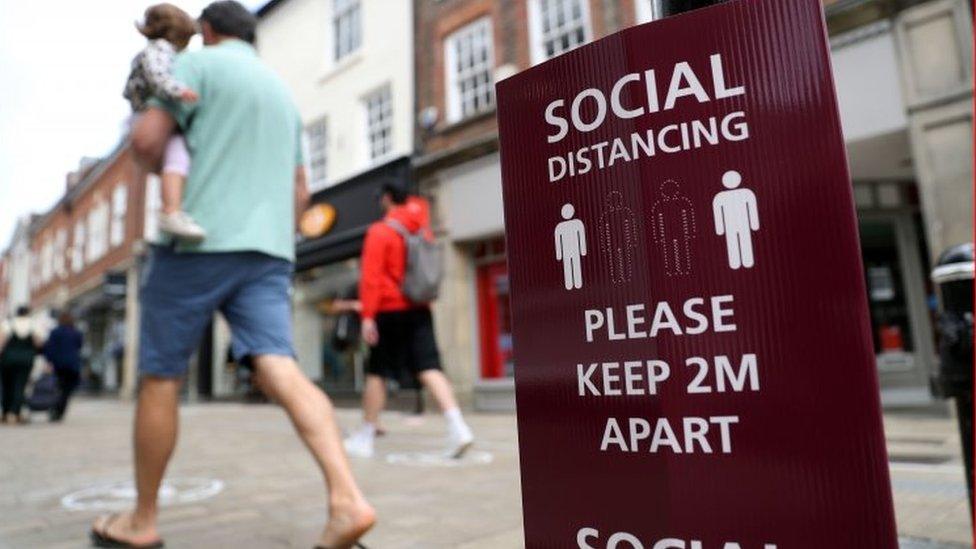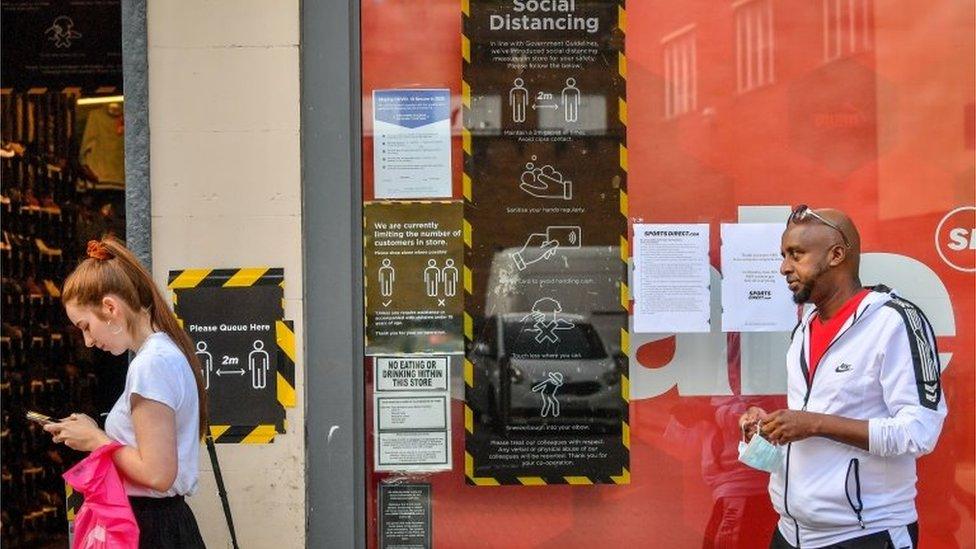Lockdown is 'economic catastrophe', says William Hague
- Published
- comments

Ex-Tory Leader William Hague says lockdown is an "economic catastrophe" and is calling for the two-metre distancing rule to be scrapped.
Writing in the Telegraph, external, Lord Hague said lockdown was increasing inequality, social tension and debt.
The hospitality industry, and some MPs and scientists, have called for the 2m (6ft) rule to be relaxed in England.
No 10 has said a review into the rule will be completed "in the coming weeks".
And Transport Secretary Grant Shapps has said the government would not amend the restriction until 4 July at the earliest.
He told BBC Breakfast the public would be "rightly very unforgiving" if the UK experienced a second spike of coronavirus caused by "rushing" a change in restrictions.
So far England, Scotland, Wales and Northern Ireland have all maintained the two-metre rule.
It comes as official figures suggest the number of workers on UK payrolls dived more than 600,000 between March and May - reflecting the impact of about six weeks in lockdown.
But economists say the full impact on employment will not be felt until wage support schemes end in October.
In his article, Lord Hague said the lockdown had been so "destructive" that it could "only ever be allowed to happen once".
He urged the government to scrap the quarantine on international arrivals - which requires all people arriving in the UK to self-isolate for 14 days - and the 2m social distancing rule.
"We can now see that it is not necessary to have a two-metre separation between people to keep the virus in retreat where it is already at a low level," he writes.
"We know this from the experience of countries such as Denmark, France and Germany where the recommended distance is shorter, and we should not have to spend weeks agonising over it."
He said lockdown was "like Dunkirk - a heroic operation in itself but the result of a massive failure".
And this was a failure "at multiple levels" he said, adding: "A failure by the whole world to prevent the trading of wild animals for consumption; by China to report the initial outbreak openly; by our and many other countries to prepare for this type of pandemic."
He said "crucial lessons" had also been learnt, including that some countries - including Germany and South Korea - "have escaped a good deal of the brutal costs of having to pursue a tight lockdown" after they were "much more ambitious about testing".
Other Tory MPs have echoed Lord Hague's words.
Former Tory Leader Iain Duncan-Smith has warned MPs that they were "in danger of losing sight of what will happen, probably to the poorest in society".
Ex-defence minister Tobias Ellwood has told the Commons that halving social distancing to 1m would be "game-changing" and should be done now.



And, in a joint article for the Telegraph, external, Carl Heneghan and Tom Jefferson from the Centre for Evidence-Based Medicine at the University of Oxford said there was no evidence for the 2m rule.
They said it was "seriously impacting schools, pubs, restaurants and our ability to go about our daily lives".
"Handwashing and encouragement are what we need, not formalised rules."

THE R NUMBER: What it means and why it matters
AIR TRAVELLERS: The new quarantine rules
LOOK-UP TOOL: How many cases in your area?
RECOVERY: How long does it take to get better?

But Mr Shapps told BBC Breakfast: "People will be, I think rightly very unforgiving about a second spike caused by rushing from two metres to one metre, or what have you.
"So, what we're doing is - right now, properly reviewing all of the evidence and we're aware that other countries have come to different conclusions."
Sir Patrick Vallance, the UK's chief scientific adviser, has said: "It is a risk-based assessment on when risk reduces and the risks are associated with distance, so risk falls after 2m.
"It is wrong to portray this as a scientific rule that says it is 2m or nothing - that is not what the advice has been and it is not what the advice is now."
- Published15 June 2020

- Published23 June 2020
